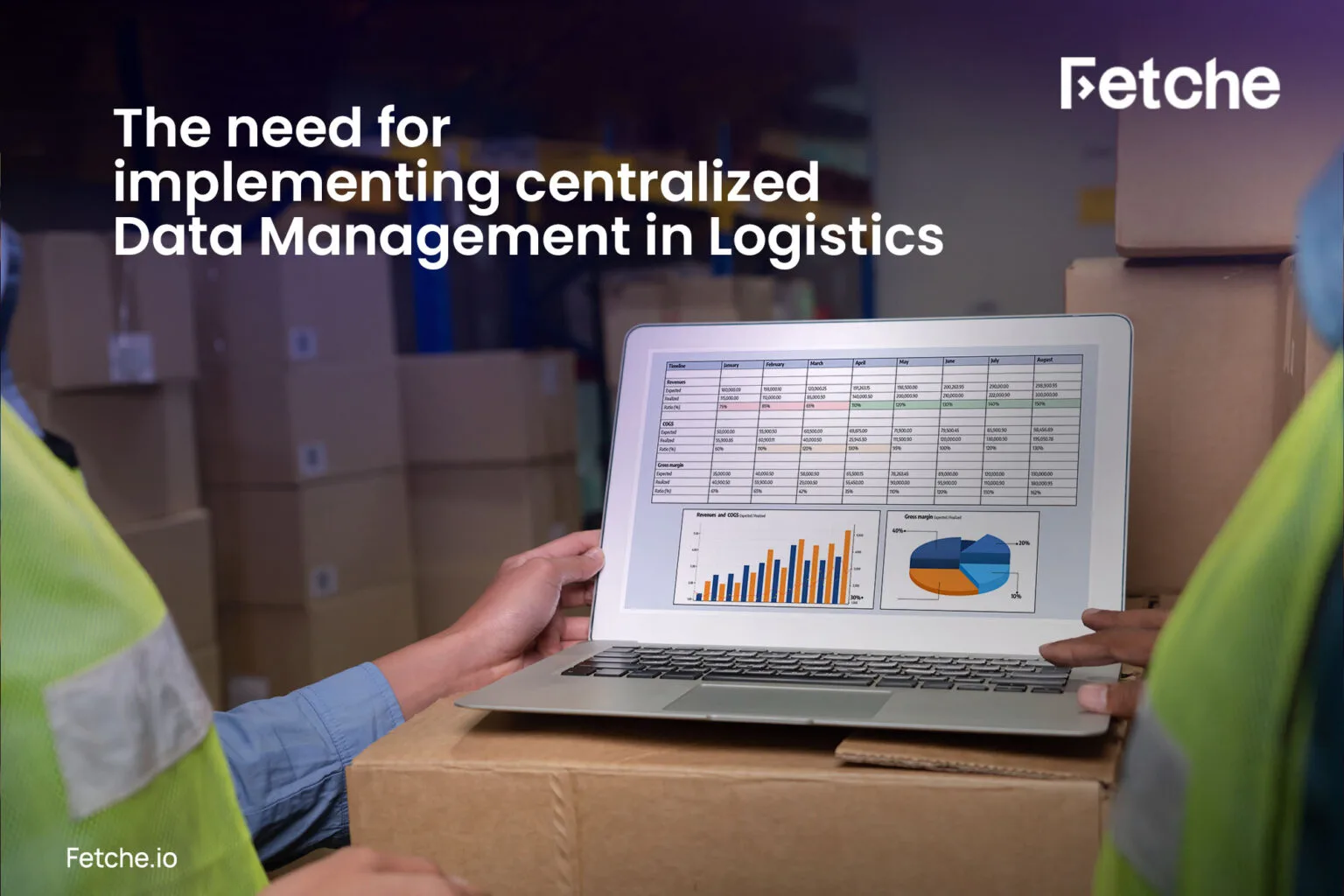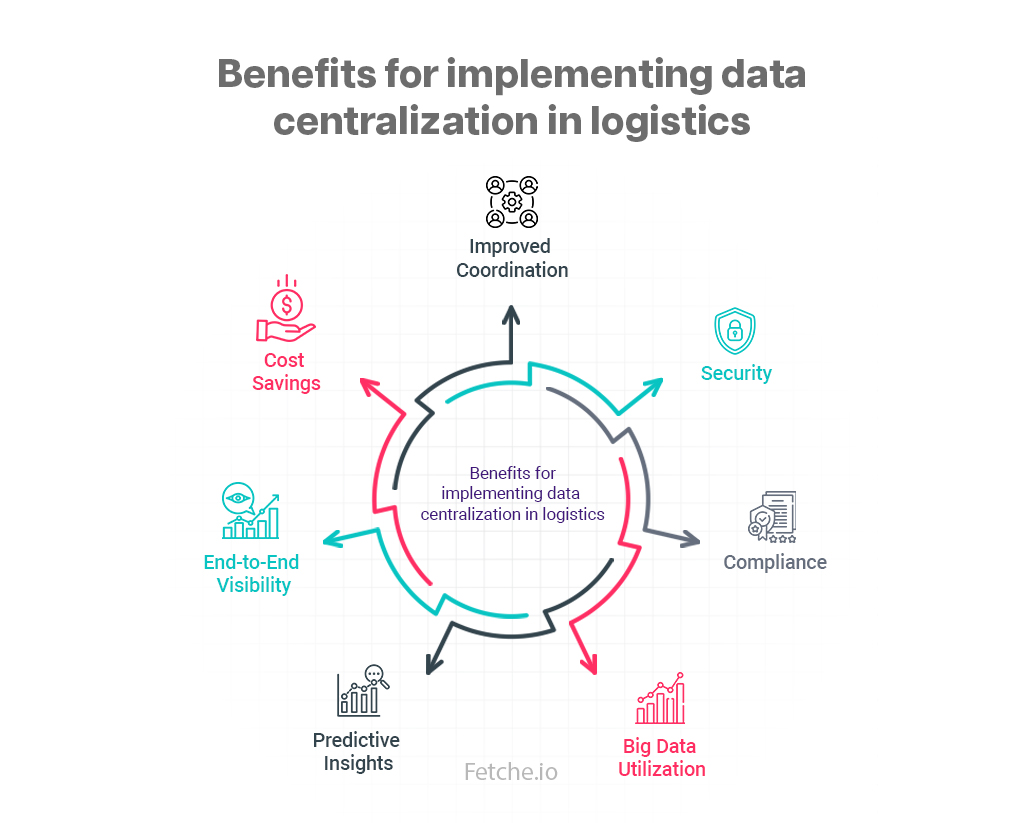
A logistics firm handles vast amounts of data every single day. And since data is the new oil, this makes up for a treasure trove of possibilities. Undoubtedly, data rules every crucial sector of logistics from warehousing to last-mile delivery. However, improper management of this data can lead to inefficiencies and costly errors. The solution to this issue is data centralization. You might have already heard this term being thrown about in the logistics industry. But many have yet to truly grasp the true significance of data centralization and the world of difference it will make for a logistics firm.
This blog was put together by popular demand from our client base, who wished to learn more about this process and its implementation. So, let’s roll up our sleeves and get right down to it.
Data Centralization Simplified
First, let’s try and answer the question, ‘What is data centralization?’.
Data centralization is the process of collecting, storing, and managing all data in a unified platform/system.
Think about it this way:
You have a business, and the different operations in it are finance, sales, marketing, customer support, and HR. Each of the operations generates its own set of data, doesn’t it?
You could set up different systems to manage each of these operations. This can include a freight management system, a warehouse management system, a finance management system, etc. In that case, each set of data will be separately collected, stored, and managed in different systems/platforms. Now, you would have multiple systems to manage, and there is no straightforward way to get a complete picture of your business with this method.
A simple solution for the aforementioned predicament is data centralization. By implementing data centralization, you can use a single platform to collect, store, and manage all data. This will unify all your data into one system.
In logistics, data centralization brings together different operations like shipment tracking, inventory management, order fulfillment, and customer support under one system. This will help eliminate duplicate data entry, minimize errors, and enhance supply chain visibility.
Do Logistics Firms Need Data Centralization?
The short answer is yes. Data centralization is the only way to analyze trends, predict demand, achieve visibility, reduce manual processes, and even improve customer satisfaction. There is a multitude of benefits for implementing data centralization in logistics. Let’s take a look:
1. End-to-End Visibility
Data centralization will provide a logistics firm with real-time visibility into every part of the process. This will let you monitor everything closely.
2. Cost Savings
Centralized data will help you automate data entry, reduce errors, and eliminate redundant processes. This will minimize operational costs and lead to significant cost savings.
3. Improved Coordination
For a logistics firm to succeed, every department must function in tandem. They must work in perfect sync to reduce bottlenecks and maximize productivity. Data centralization in logistics can ensure this by improving coordination and collaboration between departments.
4. Security
Data security is a major concern today. And since logistics firms are responsible for a vast amount of data, data security must be ensured at all times. Centralized governance can facilitate that and reduce any risk of data breaches.
5. Compliance
Following the growing concern around data security, strict regulations have been put in place. Non-compliance with these regulations can lead to hefty fines. Data centralization will enable you to comply with these regulations easily.
6. Big Data Utilization
Data-driven decision-making in logistics can be a game-changer. But many companies have no idea how to implement it. Most logistics firms are in possession of vast amounts of unstructured and structured data. However, they find it difficult to handle this data. This is where centralized logistics data management systems can help. They allow you to pull advanced analytics and AI-driven insights from your system. This will help you make informed decisions. After all, data is not simply to be stored. It is to be utilized.
7. Predictive Insights
Over the years, the data collected by a logistics firm can be used to map out trends. This info can then be used to make informed predictions and demand forecasts. This will help predict market shifts and optimize resource allocation.

Without Data Centralization Vs With Data Centralization
If you stick to different systems for each logistics operation, you will put yourself on a doomed path. Not centralizing your data means that you are creating siloed systems. These silos will result in barriers and gaps. There will be little to no visibility into shipments, increased risk of errors, delay in responding to customers, and limited insights. Ultimately, this will drive up operational costs and disrupt the smooth flow of data across your company.
To put it into perspective, let’s compare the two scenarios side-by-side: a company without data centralization and a company with data centralization.
| Without Data Centralization | With Data Centralization |
Fragmented data Little visibility into shipments High risk of errors Slow manual data entry Delayed responses to customers Limited insights High operational costs | Unified data Real-time visibility into shipments Accurate data Faster, automated workflows Real-time update Data-driven insights Reduced costs |
How to Implement Data Centralization
If you are convinced of the advantages of data centralization, the next thing you wonder about is how to implement it. Let us guide you:
- Step 1 – Assess existing data systems and identify all data sources.
- Step 2 – Identify and analyze gaps in the existing logistics software solutions.
- Step 3 – Invest in data storage solutions and centralized logistics management software.
- Step 4 – Integrate all systems, like inventory, transportation, and finance systems.
- Step 5 – Educate and train your staff on using the new system.
- Step 6 – Regularly track performance.
- Step 7 – Implement feedback loops to keep improving.
Challenges to Implementation
- Challenge 1 – High Initial Costs
Solution – Start small and scale gradually. Cloud-based logistics solutions and systems can be cost-effective.
- Challenge 2 – Integration Issues
Solution – Ensure integration capability beforehand. Always choose a flexible logistics management platform that supports integration with any existing systems. The best choice would be to implement an ERP that offers seamless API connectivity.
- Challenge 3 – Reluctance to Change
Solution – Educate and train your staff. Address concerns, if any. And be sure to demonstrate how a centralized database improves efficiency and makes their job easier.
- Challenge 4 – Data Security
Solution – Implement strong security measures and governance protocols. This will ensure data privacy and compliance.
The Future of Centralized Logistics Data Management
As we move forward, AI in logistics will enhance efficiency, and more logistics companies will adopt centralized data management. Rather than being an advantage, it will become a prerequisite. After all, the logistics data analytics and predictive insights that can be gained from it are too appealing to ignore.
It is also to be noted that these data management systems will continue to improve in the future. This will possibly present new capabilities and use cases. If you have a logistics company, your primary aim should be to keep up with the innovations and changes in the industry and embrace them.
Conclusion
Data centralization is no longer optional for logistics firms. It is more of a necessity. Without doubt, a business can significantly improve efficiency and reap profits by consolidating data in a unified system. After all, data-driven decisions are the only way to success. And anyone who fails to utilize the vast amounts of data at their disposal is setting themselves up for failure. The future of logistics belongs to companies that leverage centralized data for smarter operations and better decision-making. So invest in a centralized data management system and sail to success.
